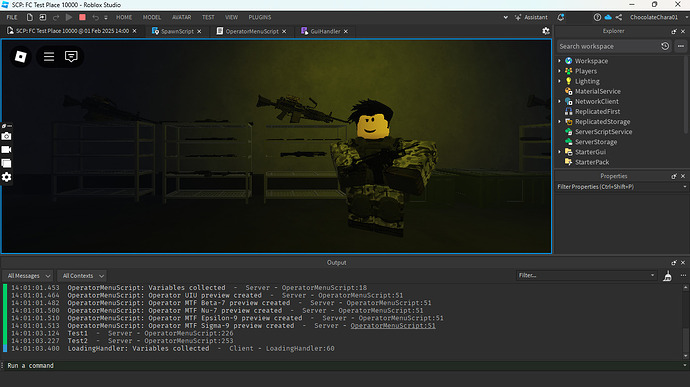-
What do you want to achieve?
When the player presses a button, I want the camera to switch from being scriptable and set to a part to custom (default) and being on the new model the player will spawn as. -
What is the issue?
The rest of the code appears to work except for the camera being set. *There are no errors in the console. * -
What solutions have you tried so far?
I’ve watched guides and endlessly scrolled the developer forums and yet I cannot find anything useful. -
Extra details
I have the code that manages cameras in a module Script called “GuiHandler” in ReplicatedStorage that is called by scripts on the client. This is the function that manages it:
-- Set up camera
function guiHandler.setCam(playerCam,camPart)
playerCam.CameraType = Enum.CameraType.Scriptable
playerCam.CFrame = camPart.CFrame
print(script.Name.. ": Player camera set")
end
This works for everything I need it to, but I’m putting it here in case it is a cause of the issue. On to what I think is more directly related somehow, when you press a spawn button, it fires a remoteEvent called “SpawnPlayer” and this code runs in a script in ServerScriptService. It basically just morphs the character:
remotes.SpawnPlayer.OnServerEvent:Connect(function(player,item)
print("Test1")
-- Perform data checks
if typeof(item) ~= "Instance" then warn(script.Name.. ": Invalid input type. Try again.") return end
-- Get in-game objects
local model = game.ServerStorage.Operators:FindFirstChild(item.Name)
local oldModel = player.Character
local newModel = model:Clone()
local spawnPoints = game.Workspace.SpawnPoints
local parts = {spawnPoints.Spawn1, spawnPoints.Spawn2,spawnPoints.Spawn3,spawnPoints.Spawn4}
local target = parts[math.random(#parts)]
-- Set model properties
newModel.Name = player.Name
player.Character = newModel
newModel.Parent = game.Workspace
-- Copy StarterCharacterScripts
for _, object in ipairs(game.StarterPlayer.StarterCharacterScripts:GetChildren()) do -- this just copies all the scripts from startercharacterscripts, you can do this with player scripts too.
local newObject = object:Clone()
newObject.Parent = newModel
end
-- Spawn player and destroy old model
newModel:SetPrimaryPartCFrame(target.CFrame)
oldModel:Destroy()
remotes.SpawnPlayer:FireClient(player,newModel)
print("Test2")
end)
You’ll notice there’s no camera changing stuff here. Knowing that you can only change the player’s camera client-side (as far as I am aware) I have it fire the client through the same remoteEvent after. I saw that the camera type being scriptable (as set by the GuiHandler) could cause issues, so rather than calling it I wrote the same code but with custom (this is on the same script that also initially fires the RemoteEvent:
game.ReplicatedStorage.Remotes.SpawnPlayer.OnClientEvent:Connect(function(operatorModel)
print("Test3")
local camera = workspace.Camera
camera.CameraType = Enum.CameraType.Custom
camera.CameraSubject = operatorModel.Humanoid
end)
Using prints, I’ve narrowed the issue down to the code above. It gets to “Test2” and “Test3” never prints to show the code ran. The code in the serverScript does fire the remoteEvent but for some reason the above code never runs. Going into the server-side view when testing I can see that it does spawn the model as well. Another notable thing is that the GUIs I have on the player’s screen go away (they are set to invisible by default and ResetOnSpawn is enabled, so that’s a possible explanation if it counts as respawning?)
The final thing I will point out here is that if I am in testing mode and manually change my camera to Custom, it will switch from the camera part that it is set to into this, which is closer to what I want but still not on the model right:
I can move the camera around the point it’s at like you would a normal character which is what I am trying to do but it is not actually on the model (Yes, I’m aware it’s in the ground that’s unrelated)



